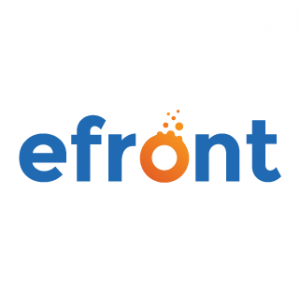A Private Cloud Solution For eLearning: The Case Of eFrontPro
Ancient Greek philosophy advocated the notion of the Golden Mean -- that is, the right thing is often found in the middle between two extremes.
Too much courage, Aristotle said, as an example, can lead to recklessness, whereas too little is, of course, cowardice; hence it's better to be somewhere in the middle.
The same holds true in tech too.
Depend on a bleeding edge technology, for example, and you'll suffer from lack of a support ecosystem, limited talent pool, and buggy premature implementations.
Use too old a technology, on the other hand, and you'll have trouble integrating it with newer stacks, and you might be left off with a legacy platform to maintain.
In this article, though, we're gonna focus on Private Cloud solutions in the context of eLearning -- and how they are sort of a golden mean between doing it all in your data center and trusting your enterprise training to a public Cloud platform.
But first, let's get it over with the terminology...
Public And Private Cloud
I assume that you know, by now, what a public Cloud is.
It's when some service provider offers their remote computing facilities as a service to individuals and businesses. This service's capacity is shared, virtualized, expandable, and offered as a turnkey solution, usually through a subscription scheme.
So, that's our first extreme. Doing it all in your data center, the other extreme, is the typical model of how enterprise IT used to be run until the Cloud era (which began during the late '00s). It requires a large-ish IT team and expensive servers, it needs lots of planning to expand, and it often represents a single point of failure.
It requires a large-ish IT team and expensive servers, it needs lots of planning to expand, and it often represents a single point of failure.
A private Cloud, a sort of golden mean between those two extremes, lets you use your own infrastructure, on your own terms, either locally (in your datacenter) or externally (collocated, rented, etc.).
A private Cloud might be operated directly by your IT, or managed by a third party, specializing in this kind of service, that takes care of setup, monitoring, backup, and maintenance issues.
The benefits of the Public Cloud are easy to see, and if you use something like Gmail over a local mail client, you are already taking advantage of that software model.
Why Would One Opt For A Private Cloud Solution?
Let's find out...
1. It's Cheaper
Public Cloud pricing might look cheap compared to the initial (up-front) costs of setting up a self-hosted solution. It's in no way cheaper in the long run, however, as virtualized servers and I/O take advantage much less from the hardware than the same services running on your own hardware. Up to 10 times less or even more (depending on over-provisioning, virtualization overhead, and other such details).
In exchange you get a lot of conveniences plus automatic scalability over a self-hosted solution, but is it really worth it? Especially since you can get those from a Private Cloud solution too ― plus great performance.
2. It's More Flexible
Sure, both a private Cloud and a public Cloud service can be virtualized and scale at will (or close).
The former though, by virtue of being private, gives you much more control and flexibility in the way you will set up, configure, and run your service.
And not just your LMS either (since we're focusing on eLearning on this site). With a private Cloud solution, you could run any kind of open source or commercial software alongside your LMS.
The same is true for access to more capacity/memory/CPU power and the like. While most public Cloud services give you several pre-configured packages and tiers (and often the option to switch to any of them at any time), with a private Cloud solution you call the shots, and you create the perfect environment for your needs in an "a la carte" manner.
3. It's More Secure
A company, like Apple or Microsoft, is a nice big round target for any hacker in the world, and the same is true for public Clouds like Amazon's and Google's. Are you really confident in having your data on the same physical hardware as tens or hundreds of other companies?
A private Cloud solution, on the other hand, means you get to choose your own stack, to harden it as much as you want, and to tune it to expose a much smaller surface area to potential attackers.
Whether you self-host or host with a private Cloud vendor, you can opt to have total control of the underlying infrastructure -- with only your own services running and only your own data stored on your private Cloud boxes.
And when it comes to a Managed Private Cloud, you can add encryption and a specialized ops team that knows how to harden and monitor systems just like yours, and you'll be way better off than with the ad-hoc security measures of your local IT staff.
4. It's More Resilient
When you are self-hosting, your data center represents a single point of failure. Sure, you can try to introduce load balancing and redundancy, but that's hard to get right, still leaves you tied to some legacy but crucial services, and can go down (and with it your whole enterprise presence) at any time -- leaving you e.g. without an LMS on the day of scheduled examinations, or just when you need to onboard the first bunch of new seasonal hires.
A private Cloud, on the other hand, can give you a distributed, on-demand scalable environment that will be more fault tolerant than an isolated data center (assuming it's distributed across different regions, with data replication, etc.), and that will free your IT to handle services that can't or should not get migrated to the Cloud (legacy back-office services, etc.).
(A public Cloud will give you the same promises at fault tolerance, but with less control, and as a one-size-fits-all solution that might, or might not, cover your unique business needs -- unless you can get your Cloud vendor to sign a meaningful SLA that doesn't give them all kinds of leeway, as most do).
5. It Gives You Control Over Your Data
Depending on your industry, you probably can't just offload your services and data to any public Cloud vendor and call it a day. It would be illegal.
All kinds of sensitive businesses, such as financial, government, and military organizations, legal firms, clinics and hospitals, and so on, have strict rules and regulations concerning data integrity, privacy, and downtime.
The same is true in businessesin what might be less heavily regulated areas that have to do businesses with government and military contractors.
In those cases, and when the flexibility of a virtualized and scalable Cloud-like deployment is crucial, a private Cloud can be just the right solution, as you retain control over the infrastructure and services, and can opt to implement all kinds of prospective measures, from two-way authentication to end-to-end encryption of any data flows.
Decided yet?
Those are some of the considerations in favor of Private Cloud deployment. Whether a public Cloud solution might be a better fit for your eLearning program, that's something that you will need can determine based on your goals and business need.
That said, if you share the concerns and constraints mentioned above, there are platforms such as eFrontPro that check all the right boxes, and come in self-hosted, Private Cloud and Managed Private Cloud versions for you to chose. Maybe take them for a test drive and see for yourself if it's the right approach for your business?
Conclusion
In this article, we've examined 5 strong points of Private Cloud solutions. And yes, some of those are shared with Public Cloud solutions, where others are shared with self-hosting. But that's exactly the value proposition of a Private Cloud: that it a kind of Golden Mean option that gives you the best of both of these worlds.








